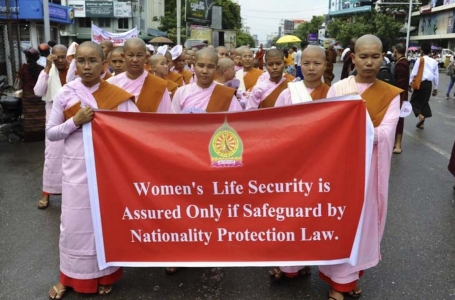From Saffron Revolution to Mabatha: Religion and Nationalism in Burma
10 January 2019
From Saffron Revolution to Mabatha: Religion and Nationalism in Burma
Alexander Horstmann, Associate Professor of Modern Southeast Asian Studies, School of Humanities, Tallinn University
January 10, 2019, 4.15 -5.45 pm

In 2007, a social movement of Buddhist monks took to the streets to protest against the military junta and to support Aung San Suu Kyi. This movement coincided with the student movement and was violently suppressed, because the generals wanted to keep in power and were afraid of the revenge of the National League for Democracy (NLD). Now, things are changing.
A new movement emerged, but with anti-democratic intentions, called MaBaTha: The organization to protect race and religion. This organization successfully campaigned for the implementation of 4 Religious Protection laws that were mainly targeted against marriage of poor Buddhist women with Muslim men. MaBaTha has lately come into conflict with the religious organization of the state, but has established close links to some military generals. More important, MaBaTha donates the religious organization of the laity in present-day Burma (Myanmar) and is also greatly popular among Buddhists in Mon, Shan and Kayin states.
The presentation will discuss these issues and especially the meaning of the rise of religious nationalism for the fragile semi-democratic opening and for the future of multi-religious Myanmar and especially for the peace process in the ethnic minority regions. It will also discuss the role of Buddhist political activism in the Theravada Buddhist world and Islamophobia in particular.

Alexander Horstmann is Associate Professor of Modern Southeast Asian Studies at the School of Humanities at Tallinn University, Estonia. His main research interests include Asian borderland studies, human rights and humanitarianism, religion and refugees, minority studies, and Theravada Buddhism. His teaching in Tallinn includes Asian societies and politics, Everyday Multiculturalism, interdisciplinary LIFE courses, and PhD courses in cultural studies. He published 7 books and numerous research articles on the anthropology and sociology of Southeast Asia and beyond, most recently with Jin-Heon Jung (2015): Building Noah’s Ark for Migrants, Refugees, and Religious Communities , Palgrave (Anthropology of Asia Series). Alexander Horstmann was a research fellow and research partner in the Department of Religious Diversity at Max Planck Institute for the study of religious diversity.
Organizer: Numata-Zentrum für Buddhismuskunde der Universität Hamburg, Hamburger Gesellschaft für Thaiistik e.V. mit dem Arbeitsbereich Thaiistik der Abteilung Sprachen und Kulturen Südostasiens
Location: Edmund-Siemers-Allee 1, ESA-Ost, Room 123
The flyer can be found here.
